Roof Repair Rochdale
Top Fix Roof in Rochdale
Get up to 3 Fix Roof quotes for your project today! Compare profiles, reviews, accreditations, portfolio, etc... and choose the best service.
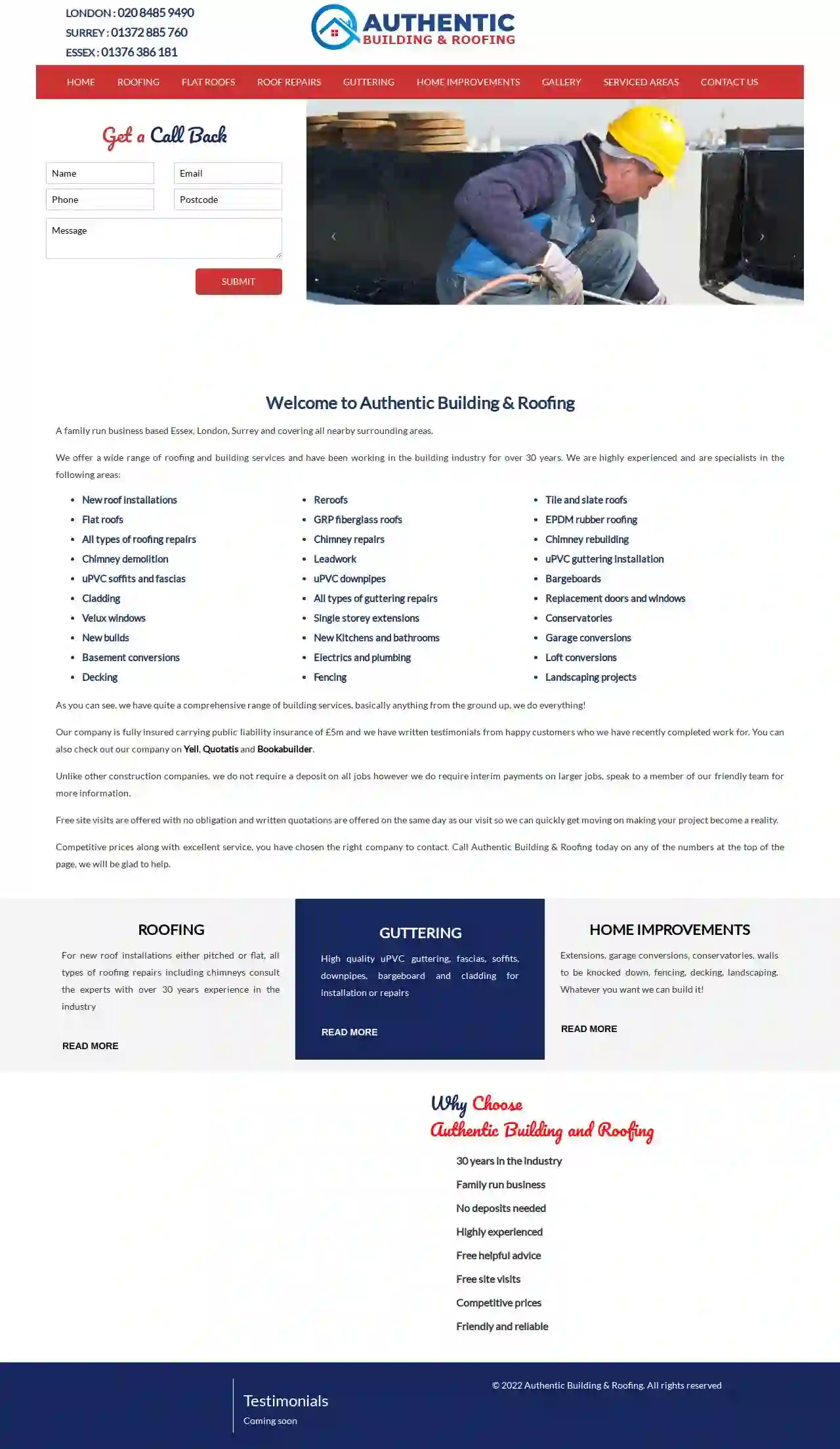
Authentic roofing services
51 reviews75A Church Street, Witham, CM8 2JP, GBWelcome to Authentic Building & Roofing A family run business based Essex, London, Surrey and covering all nearby surrounding areas. We offer a wide range of roofing and building services and have been working in the building industry for over 30 years. We are highly experienced and are specialists in the following areas: New roof installations Reroofs Tile and slate roofs Flat roofs GRP fiberglass roofs EPDM rubber roofing All types of roofing repairs Chimney repairs Chimney rebuilding Chimney demolition Leadwork uPVC guttering installation uPVC soffits and fascias uPVC downpipes Bargeboards Cladding All types of guttering repairs Replacement doors and windows Velux windows Single storey extensions Conservatories New builds New Kitchens and bathrooms Garage conversions Basement conversions Electrics and plumbing Loft conversions Decking Fencing Landscaping projects As you can see, we have quite a comprehensive range of building services, basically anything from the ground up, we do everything! Our company is fully insured carrying public liability insurance of £5m and we have written testimonials from happy customers who we have recently completed work for. You can also check out our company on Yell, Quotatis and Bookabuilder. Unlike other construction companies, we do not require a deposit on all jobs however we do require interim payments on larger jobs, speak to a member of our friendly team for more information. Free site visits are offered with no obligation and written quotations are offered on the same day as our visit so we can quickly get moving on making your project become a reality. Competitive prices along with excellent service, you have chosen the right company to contact. Call Authentic Building & Roofing today on any of the numbers at the top of the page, we will be glad to help.
- Services
- Why Us?
- Accreditations
- Gallery
Get Quote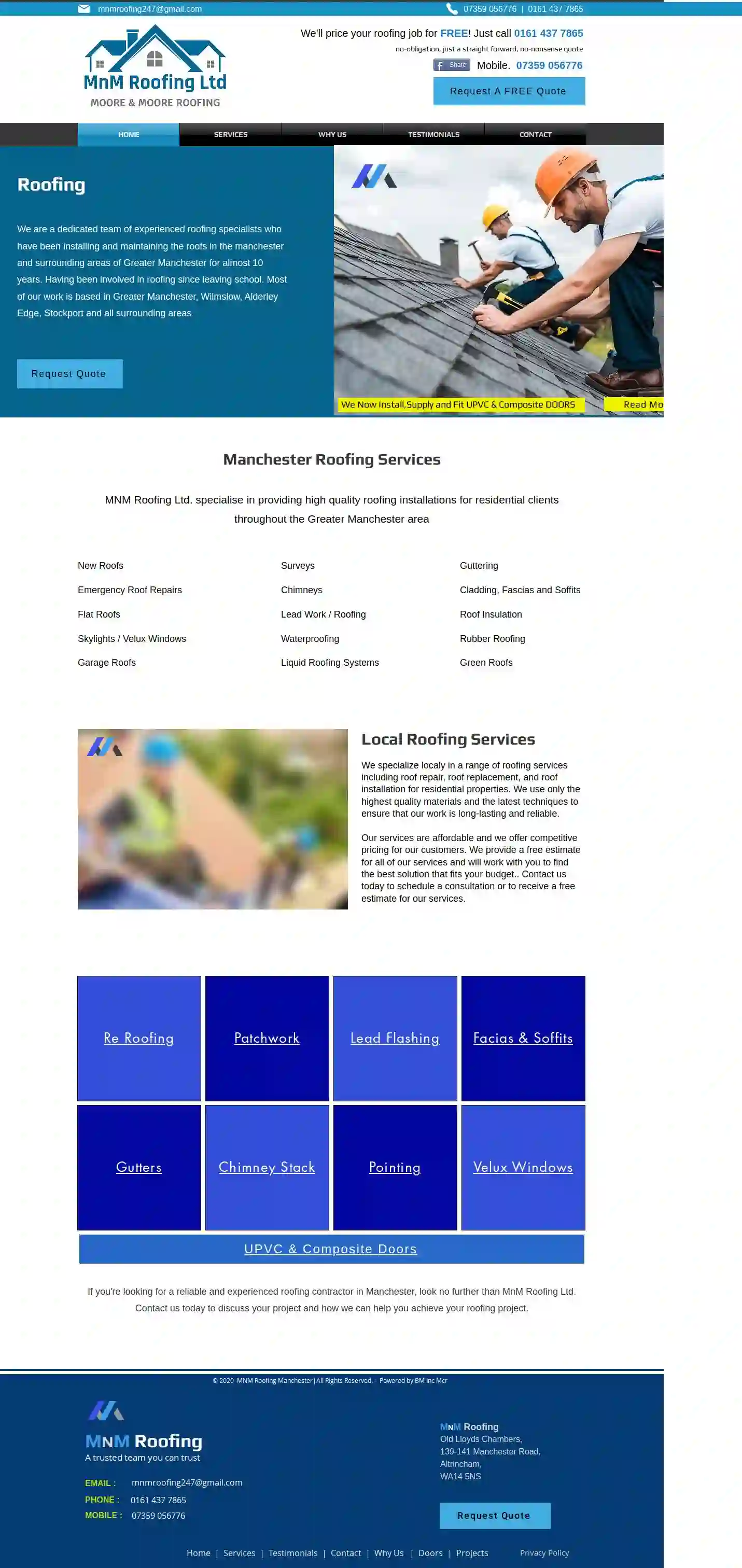
MNM Roofing Ltd
55 reviews139-141 Manchester Road, Old Lloyds Chambers, Altrincham, WA14 5NS, GBMNM Roofing Ltd. is a dedicated team of experienced roofing specialists serving the Manchester and surrounding areas of Greater Manchester for almost 10 years. With a history rooted in roofing since leaving school, the company focuses primarily on Greater Manchester, Wilmslow, Alderley Edge, and Stockport. MNM Roofing Ltd. specializes in providing high-quality roofing installations for residential clients throughout the Greater Manchester area. They offer a comprehensive range of services, including new roofs, emergency roof repairs, flat roofs, skylights/Velux windows, garage roofs, surveys, chimneys, lead work, waterproofing, liquid roofing systems, guttering, cladding, fascias and soffits, roof insulation, rubber roofing, and green roofs. The company prides itself on using only the highest quality materials and the latest techniques to ensure long-lasting and reliable work. They are committed to providing affordable services with competitive pricing and offer free estimates for all their services. MNM Roofing Ltd. is a trusted team you can rely on for all your roofing needs. Contact them today to discuss your project and how they can help you achieve your roofing goals.
- Services
- Why Us?
- Gallery
Get Quote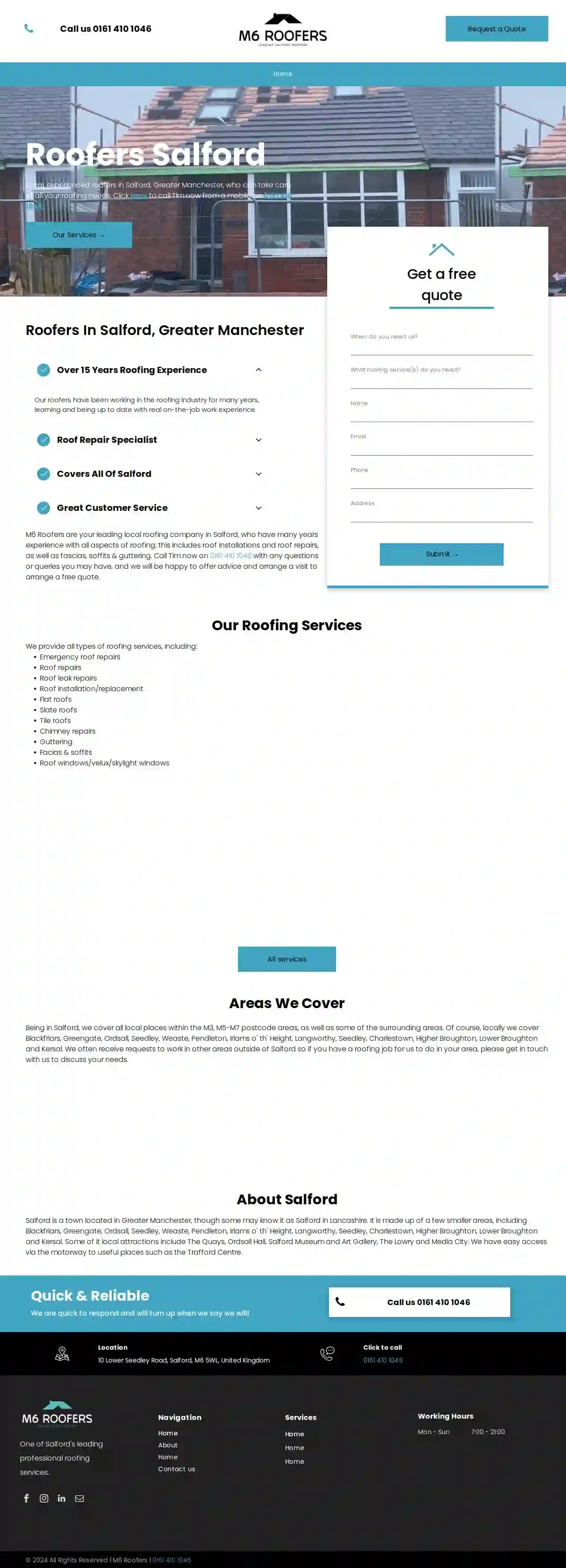
M6 Roofers
55 reviews10 Lower Seedley Road, Salford, M6 5WL, GBM6 Roofers are your leading local roofing company in Salford, who have many years experience with all aspects of roofing; this includes roof installations and roof repairs, as well as fascias, soffits & guttering. We provide all types of roofing services, including emergency roof repairs, roof repairs, roof leak repairs, roof installation/replacement, flat roofs, slate roofs, tile roofs, chimney repairs, guttering, facias & soffits, and roof windows/velux/skylight windows. Our roofers have been working in the roofing industry for many years, learning and being up to date with real on-the-job work experience. We are based in M6 Salford, and work here and all surrounding Salford areas, including Seedley, Irlams o' th' Height, Higher & Lower Broughton, Worsley and Wardley. We provide a high quality yet easy personable experience, and are quick to respond and will turn up when we say we will!
- Services
- Why Us?
- Gallery
Get Quote
One Stop Roofing Shrewsbury - Flat Roofing & Roof Repairs
Lower House Farm, Sidbury, Bridgnorth, WV16 6PY, GBAt One Stop Roofing, our specialization lies in flat roof installations, with a particular expertise in EPDM rubber roofs, rubber, and fiberglass. We take pride in offering a comprehensive range of services, including roof installation, repairs, and maintenance. Additionally, we have extensive knowledge and experience in handling fascia's, soffits, roof lanterns, skylights and guttering, ensuring that all your roofing needs are taken care of under one roof. We are a family business with over 35 years’ experience in the roofing trade, specializing in rubber and fibreglass roofing, as well as all types of roof and chimney repairs. Our team supplies and fits new build roofs, flat roofs, lantern and warm roofs - all using the best materials and construction to ensure you are dry and warm, no matter what the weather.
- Services
- Why Us?
- Accreditations
- Our Team
- Testimonials
- Gallery
Get Quote
H2O Roofing and Building
53 reviewsCross Keys House, 22 Queen Street, Salisbury, SP1 1EY, GBH2O Roofing & Building is a family-run business based in Berkshire with over 20 years of experience providing reliable roofing and driveway services across Berkshire, Oxfordshire, and Wiltshire. We handle everything from installations and maintenance to simple repairs, catering to both domestic and commercial clients. No project is too big or too small for us. Our mission is to be trustworthy, customer-oriented, and deliver top-quality workmanship. We pride ourselves on providing individual attention to each customer, meeting project deadlines, and offering 24/7 availability. We are fully qualified and insured, and our commitment to unparalleled customer service and competitive quotes can often save you thousands.
- Services
- Why Us?
- Accreditations
- Our Team
- Testimonials
- Gallery
Get Quote
H20 roofing and building ltd
N/A, GBH2O Property Maintenance is a family-run, recommended and vetted business with over 25 years of experience in providing reliable roofing and building solutions. We pride ourselves on delivering high-quality workmanship and customer satisfaction, ensuring your roofing needs are met first time, every time. Our team of expert roofers are professionally trained to meet the highest quality standards and provide tailor-made solutions accredited by leading manufacturers. We offer a comprehensive range of services, including roof repairs, flat roof installations, guttering and fascia services, Velux roof windows, moss removal, exterior painting, and chimney services. We use top-quality materials from well-known manufacturers and guarantee our work. We are committed to providing cost-effective solutions and a stress-free experience for our clients.
- Services
- Why Us?
- Accreditations
- Our Team
- Testimonials
- Gallery
Get Quote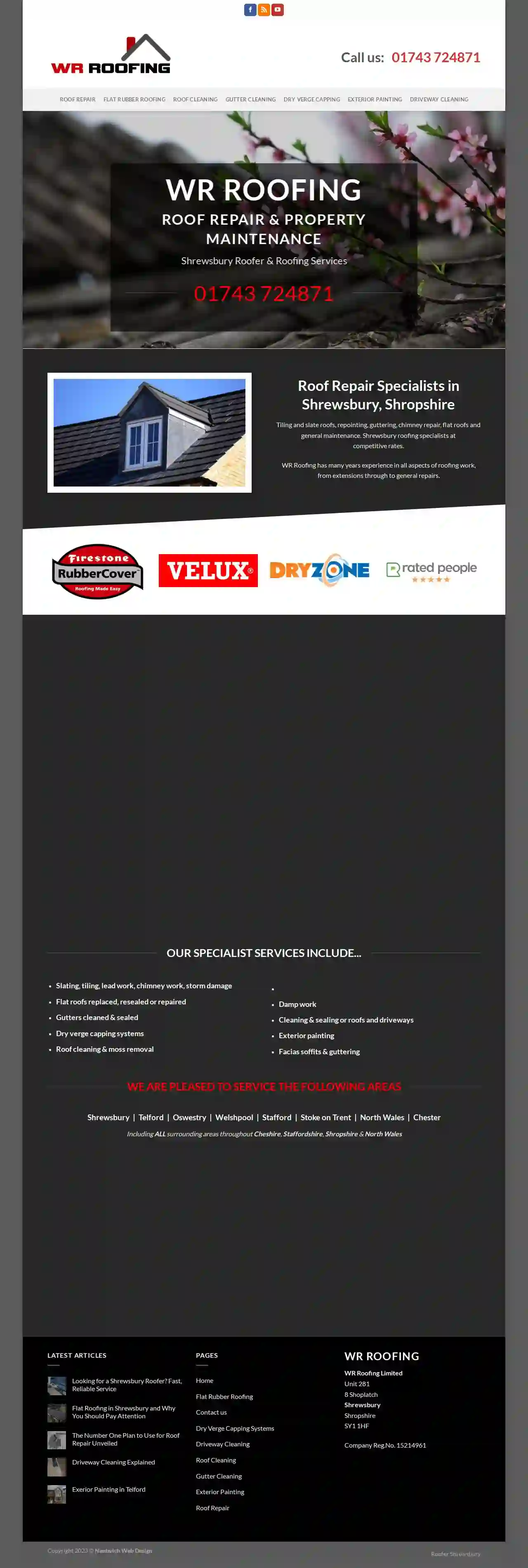
WR Roofing
4.661 reviews8 Shoplatch, Unit 281, Shrewsbury, SY1 1HF, GBWR Roofing has many years experience in all aspects of roofing work, from extensions through to general repairs. Our Specialist Services Include... Slating, tiling, lead work, chimney work, storm damage Flat roofs replaced, resealed or repaired Gutters cleaned & sealed Dry verge capping systems Roof cleaning & moss removal Damp work Cleaning & sealing or roofs and driveways Exterior painting Facias soffits & guttering We are pleased to service the following areas Shrewsbury | Telford | Oswestry | Welshpool | Stafford | Stoke on Trent | North Wales | Chester Including ALL surrounding areas throughout Cheshire, Staffordshire, Shropshire & North Wales
- Services
- Why Us?
- Gallery
Get Quote
Crescent Roofing
2.33 reviewsUnit 10, The Mill, 1000 Trafford Park, Manchester, M5 4AA, GBCrescent Roofing, based in Salford, Manchester, is a family-run business established in 1989. They specialize in meeting the roofing needs of every customer, prioritizing safe systems of work, quality workmanship, and superior materials. Whether it's a small repair or a large-scale project, Crescent Roofing prides itself on providing courteous, professional service and a dedication to health and safety. They offer a wide range of roofing solutions, including pitched roofing, flat roofing, and various materials like slates, tiles, lead, built-up felt, single ply, EPDM, GRP, sheeting, and cladding. With over 373 years of combined experience on their team, Crescent Roofing is committed to delivering quality roofs that last. They are proud to be an Investor in People silver awarded organisation, constantly striving to improve their business practices and employee skills.
- Services
- Why Us?
- Accreditations
- Gallery
Get Quote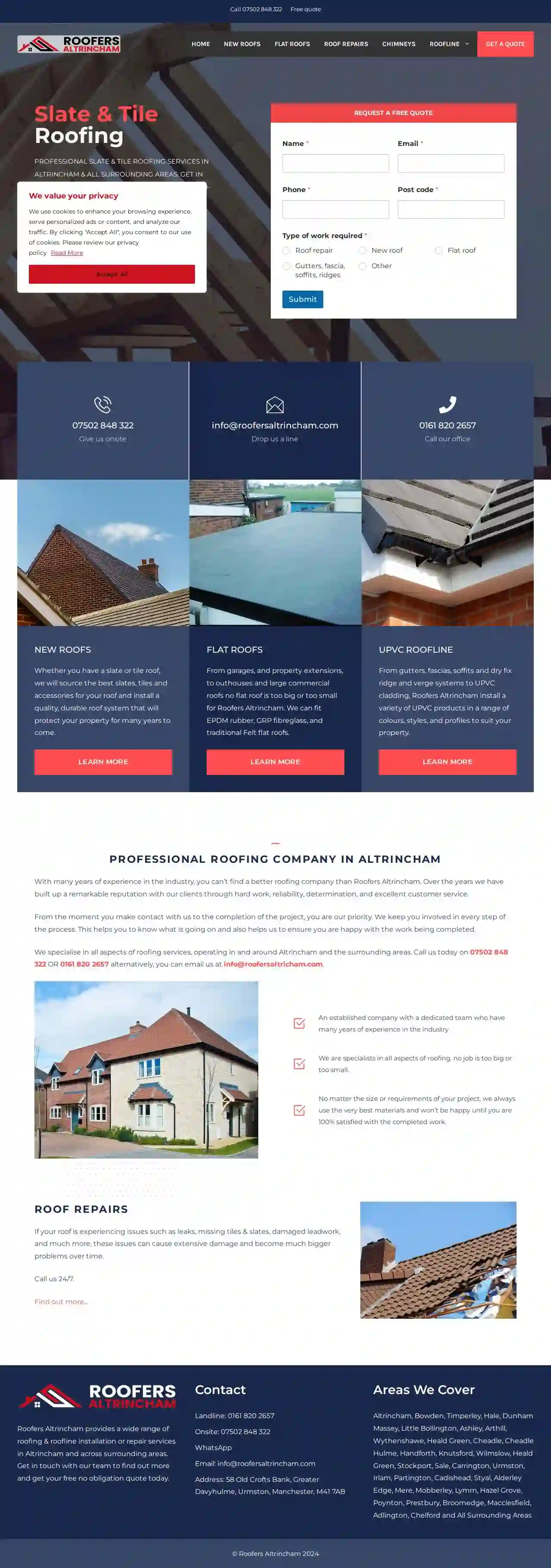
Roofers Altrincham
51 reviews58 Old Crofts Bank, Greater Davyhulme, Urmston, M41 7AB, GBRoofers Altrincham is a family-run roofing company serving Altrincham and the surrounding areas. With many years of experience in the industry, they pride themselves on their hard work, reliability, and excellent customer service. They offer a complete range of roofing services, including new roofs, flat roofs, roof repairs, gutters, fascias, soffits, chimneys, and dry verges & dry ridges. Roofers Altrincham uses the very best materials and ensures customer satisfaction with every project. They are available 24/7 for roof repairs and encourage customers to contact them for a free, no-obligation quote.
- Services
- Why Us?
- Gallery
Get Quote
Salford Roofers 24 7
2 Hornbeam Way, 4.3b Melia House, Manchester, M4 4AY, GBManchester Roofers 24 7 is a leading roofing company serving Manchester and Cheshire. With years of experience, we provide a comprehensive range of roofing services for both domestic and commercial clients. Our team of skilled and experienced roofers has a proven track record of successfully completing all types of roofing projects. We are committed to delivering high-quality workmanship, exceptional customer service, and competitive pricing. Whether you need roof repairs, flat roof installations, slate or tile roof replacements, chimney repairs, guttering services, or fascia and soffit work, Manchester Roofers 24 7 is your trusted partner. We are available 24 hours a day, 7 days a week to address your roofing needs promptly and efficiently. Contact us today for a free quote and let us take care of your roofing requirements.
- Services
- Why Us?
- Gallery
Get Quote
Over 12,314+ Roofing Businesses onboarded
Our roofing experts operate in Rochdale and surrounding areas!
Roofyng.co.uk has curated and vetted the Best Roofers arround Rochdale. Find a trustworthy business today.
Roof Repair FAQs
- Proper Licensing and Insurance: They should be licensed to operate in your area and carry liability insurance and workers' compensation insurance to protect you from potential risks.
- Established Business Presence: Look for a contractor with a physical address, a website, and a phone number. Avoid contractors who operate solely from a mobile phone or have a limited online presence.
- Positive Reviews and Testimonials: Check online reviews from previous customers on reputable platforms like Google, Yelp, or Trustpilot. Positive feedback and high ratings suggest a trustworthy contractor.
- Professional Communication: A reputable contractor will be responsive to your inquiries, answer your questions clearly, and provide detailed explanations of the work involved and associated costs.
- Written Estimates and Contracts: Insist on receiving a written estimate outlining the scope of work, materials, labor costs, and payment terms. A detailed contract should be provided before any work begins, clearly defining all project aspects.
- Workmanship Warranty: Reputable contractors stand behind their work by offering a workmanship warranty that covers defects in their installation for a specified period.
Can I get a roof repair estimate online?
How much does it cost to repair a roof in the UK?
How can I fix a small roof leak myself?
How can I tell if a roofing contractor is reputable?
Can I get a roof repair estimate online?
How much does it cost to repair a roof in the UK?
How can I fix a small roof leak myself?
How can I tell if a roofing contractor is reputable?
- Proper Licensing and Insurance: They should be licensed to operate in your area and carry liability insurance and workers' compensation insurance to protect you from potential risks.
- Established Business Presence: Look for a contractor with a physical address, a website, and a phone number. Avoid contractors who operate solely from a mobile phone or have a limited online presence.
- Positive Reviews and Testimonials: Check online reviews from previous customers on reputable platforms like Google, Yelp, or Trustpilot. Positive feedback and high ratings suggest a trustworthy contractor.
- Professional Communication: A reputable contractor will be responsive to your inquiries, answer your questions clearly, and provide detailed explanations of the work involved and associated costs.
- Written Estimates and Contracts: Insist on receiving a written estimate outlining the scope of work, materials, labor costs, and payment terms. A detailed contract should be provided before any work begins, clearly defining all project aspects.
- Workmanship Warranty: Reputable contractors stand behind their work by offering a workmanship warranty that covers defects in their installation for a specified period.